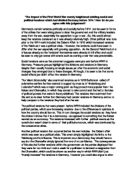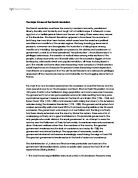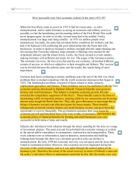How far did government policies change towards agriculture in Russia in the period 1856-1964?
How far did government policies change towards agriculture in Russia in the period 1856-1964? Throughout the period 1856-1964, there was considerable change and continuity between the different agricultural policies implemented by successive Russian governments. From how they regarded and engaged with the peasantry, to the investment that was put into agriculture and how famines were caused and dealt with. For the Tsarists and the Communists the peasantry has always represented the biggest obstacle to progress, the desire for both regimes was to transform and control rural life through their respective agricultural policies. Appointed Prime Minister (1906) by Nicholas II[1], Stolypin was instructed to overhaul government policy on land distribution and thus capitalise on the now free peasants in order to “wager on the strong”[2]: in which he meant the wealthier peasants. The Emancipation Edict (1861)[3] created these, now free, peasants out of the slavery of Serfdom. Once working on the lands of the Lord of the Manner these peasants were given an allocation of land by the government – for which they would pay for over 49 years of redemption payments at 6% interest.[4] The result of this extra burden on the peasants, along with the fact they now farmed land that was now, on average, 1/5th less than before emancipation,[5] was initially severe disturbances: 1859 in
To what extent was Hitler responsible for the outbreak of the Second World War in 1939?
To what extent Hitler responsible for the outbreak of the Second World War in 1939? The question of who was to blame for the Second World War is a controversial topic among Historians and rightly so. At the end of the war most academics and politicians were content to blame Hitler and the Nazi Party, this was especially the case once the evils of Nazi Germany had been uncovered in the form of the concentration and extermination camps. Likewise the allies had to sell to the public the argument that they were fighting against an evil system that had intentions of world domination. Hitler therefore was the cause of World War Two and for some time this argument seemed to fit the mould. Hitler had after all had published his evil intent in Mein Kampf, he talked about the need for living space and the survival of the fittest when he had his desires on Russia. Hitler had built up his army and by 1939 had marched into the Rhineland, taken over Austria and Czechoslovakia and finally invaded Poland. These are clear indications of a man intent on war from the beginning are they not? The argument that Hitler intended on war and was therefore the cause of the war is one which does not always stand up to scrutiny. As far as AJP Taylor is concerned Hitler, although wicked and evil, does not alone deserve to be blamed for the war. Hitler Taylor argues was exactly the same as most
The Battle Of Britain
Dunkirk One French General suggested that Britain was waiting 'to have its neck rung like a chicken'. That was the way it was because Britain was in desperate trouble with its army in disarray and its commercial shipping and navy taking heavy losses from the German U-boats. Although Britain was preparing for a massive German invasion Hitler did not think there was a reason to attack Britain and would have preferred to make peace with her and to leave the British Empire untouched. But there was no way that Churchill would agree to any peace deal with Germany as if that happened Germany would have a free rein in Europe and ruin Britain's economy. Realising that there was no way that Britain wanted peace, Hitler ordered her invasion. The planned date for invasion Sealion was 15th September 1940. The problem for the German army was that this would be like no battle so far as it would not just be a case of crossing over some flat plain and blasting a hole through a weak army's defences. He had to cross over a twenty mile stretch of sea and, with the RAF above, any men in landing craft and on boats would be blown to kingdom come. Thus Hitler had to defeat the RAF before he could proceed to invade Britain. Hitler's attempts to destroy the RAF with the Luftwaffe was called The Battle Of Britain. coursework The Battle Of Britain The Luftwaffe was
Stalin Vs. Trotsky.
STALIN VS. TROTSKY I. Dzhugashvili and Bronstein Joseph Stalin, born Dzhugashvili, and Leon Trotsky, born Bronstein, were the same age, and both had been from early youth members of the Russian Social Democratic party. As dedicated Communists, they had common basic outlook: they were philosophical materialists, committed to the unity of theory and practice and bent upon spreading Communism throughout the whole world. While Lenin was alive (at any rate until 1922) both men had a secure place in his favor and therefore in the party as a whole. Since 1917, at least, Trotsky had supported Lenin on the main issues and seemed to have more of his candor and flexibility than Stalin. However, as Lenin sickened and died, the mutual antagonism between Trotsky and Stalin, who had never been compatible, deepened into a life-and-death struggle. A. Stalin It is difficult to compare the later lives of the two men, for Stalin achieved sole power and Trotsky was exiled. Since Trotsky thus escaped Stalin's dilemmas, it is uncertain how he would have responded to them, although he detested Stalin's rule. Stalin hated his adversary so deeply that he caused his name to be written simply "Judas Trotsky" in officially commissioned books, but he borrowed many of his ideas and methods. Their earlier lives, however, suggest something of the personal differences which were to be complicated by
Stalin's Rise To Power
Essay - Stalin A.C. 2.1, 3.1, 5.1 02/03/10 Critically evaluate Stalin's rise to power. Josef Stalin was a much feared and reviled dictator who was responsible for the deaths of millions of Soviet citizens. It has been noted that "he is the man who turned the Soviet Union from a backward country into a world superpower at unimaginable human cost." (pbs.org/redfiles) [30 Jan 2010]. Born 1879 in Georgia to a poor, dysfunctional family, Stalin was regularly beaten by his violent father and developed a bad relationship with his religious mother, who sent him to a religious school to study to become a priest. Stalin did not complete his studies but instead was drawn towards the cities active revolutionary scene. It has been suggested that the violence he suffered at the hands of his father played a major role in developing his strength and determination (pbs.org/redfiles) [30 Jan 2010]. However, there are many other contributory factors that should be taken into consideration when evaluating Stalin's rise to power, including the various posts he held, his willingness to maintain Lenin's legacy and the weakness of his main rival, Leon Trotsky. Historical interpretation is an effective way for historians to translate the past into a meaningful sequence of events; however, the interpretation will vary depending on which historical schools viewpoint is being portrayed. The
Rise of Stalin.
Question: Rise of Stalin Lenin slow decline of health gave the government time to look for a successor. Four of the successors were Joseph Stalin, Gregory Zinoviev, Leon Kamenev and Leon Trotsky. Lenin wanted Trotsky to be his successor, as he believed in his views on future communism. Trotsky believed that it would only survived if the other countries were communists. Lenin did not support Stalin because he thought he was too keen for personal power. He also wrote a political testament shortly before his death,"I am not sure he always will know how to use caution with sufficient caution, therefore I proposed to the comrades that a way to be found to remove Stalin. But this testament was not read out, as Stalin used his influence to prevent it from reading out. He used his position, as General Secretary to win support, while part of his responsibility was to post positions to members of the groups, so he used this opportunity to removed opponents and replaced supporters. After Lenin's death, he also encouraged Cult of Lenin, (e.g. the embalming and permanent display of Lenin's body.) He also presented himself as Lenin close follower (e.g.: chief mourner), hence fool the people into thinking that he was the obvious successor. Kamenev and Zinoviev allied with Stalin to pushed Trotsky into exile, as they find him the main rival. Later on, Stalin also used his supporters to
Assess the impact that Lenin had on Russia and the Russian people.
Assess the impact that Lenin had on Russia and the Russian people. Lenin was and still remains one of the most key political figures in world history and the most influential communist leaders ever, so there is no doubt about the fact that Lenin had a huge impact on both Russia and the Russian people. To assess the scale of the impact and the changes brought about by Lenin I will have to assess both the changes brought about during Lenin's lifetime (short-term) and the changes brought about after his death that could not have happened without him (long-term). Lenin came to power in November 1917 as the result of a communist revolution, so from the moment he came to power he was already making an impact. Without the leadership of Lenin through the fight for power and the revolution the communists would probably have never managed to gain power. The abdication of the Tsar led to a huge rise in revolutionary groups such as the Bolsheviks. This revolution though, was only a short- term impact on Russia and it's people. Lenin took over Russia at a time when the country was very poor economically, the people were starving and the weather was appalling. Temperatures were reaching 35 degrees below zero in Petrograd and people had to queue for hours to buy food, which was in short supply. Factories were either closing due to lack of fuel or because of
Assess the impact that Stalin had on Russia and the Russian people
Assess the impact that Stalin had on Russia and the Russian people Stalin came to power in 1928 after cleverly outsmarting his political opponents by playing them off against each other, while he remained an unlikely source of leader until only he remained. Stalin changed the economic footing of Russia enormously. Industrialization, the development of industry was massive. After 13 years, production figures for almost all products flourished to a huge extent. Most increased by at least 1000%. However this cannot disguise the fact that people claimed that they had achieved quotas to avoid getting punished. They were also the figures published by Stalin and the USSR, and for this reason would have been doctored. When industrializing a country it begins slowly and the 'take-off' point is achieved where a quantum leap is activated. This would explain the astounding rise of the economy. There is no way that life in Russia was better than that in the advanced countries. However after the Depression of 1929, 15 million Americans were unemployed, many living in shantytowns made of rubbish, whereas in Russia there was no unemployment - every worker had a job. In less than 10 years ruling Russia, Stalin had taken it from a backward country to one second only to the US in terms of industrial output. This was an incredible achievement and was remarkably sustained throughout the war.
Assess the Impact that Stalin had on Russia and the Russian People
Q3. Assess the Impact that Stalin had on Russia and the Russian People Stalin ruled Russia from 1928 to 1953. He had some short-term impact on Russia but he was single-minded and not pragmatic- unlike Lenin- therefore his impact was mostly long-term. A significant belief of Lenin's had been that everybody should be equal. Where women were concerned Stalin had other ideas. He reversed many laws from the 1920s relating to women's emancipation, in favour of strengthening the family. For example, divorce and child support (if unmarried) became more difficult to obtain, abortion was made illegal, and women lost rights in the family. Reasons being that many children had been born out of marriage. By 1930 Moscow was awash with a high number of homeless children who had no family and were seen as a stain on the perfect communist society that Stalin aspired to. Women lost the rights they had received under Lenin's rule, silently infuriating them. Traditional Russians, tsar-like minded, were pleased to see women relegated to the second class again. It had mixed impact for different groups. Like the women under Stalin's Russia, artists and freethinkers were oppressed and reverted to the Tsarist-like censorship. Individuality was forbidden under Stalin and writers and artists were forced to produce work that glorified workers, peasants and the revolution. Likewise, newspapers were
'Evacuation Was a Great Success' - Do You Agree or Disagree With This Interpretation?
'By failing to resist aggression in the 1930s, the League of Nations made Hitler's work easy.' How fair id judgment on actions of the League of Nations in the 1930s? In the 1930s common consensus among historiographers is that the League of Nations' power declined. This loss of power made it impossible for the league to check the radical rise in Nazi Germany under Hitler. Hitlers Plan's: * Get revenge on the November Criminals * Exterminate anybody non Ayrians * World Domination Depression: * Gave Hitler more power as he was able to promise German's jobs and bread * None of the Member countries wanted to pledge their armies as they couldn't afford it. * Mussolini needed to take peoples attention away from economic problems so tried to make an empire * Japan had to invade Manchuria so as to get some money Appeasement: * Germany leaves the World Disarmament Conference and the League of Nations in 1933. This meant that she could concentrate on her own plans and ignore what the League of Nations ruled * League of Nations didn't oppose any of Hitler's moves: Conscription, occupation of the Rhineland, Invasion of Poland. * As they both had the same political views and were both being restricted by the League Mussolini and Hitler came together in the Rome-Berlin axis. * Britain and France were giving Hitler exactly what he wanted Foreign Treaties: * Munich



























